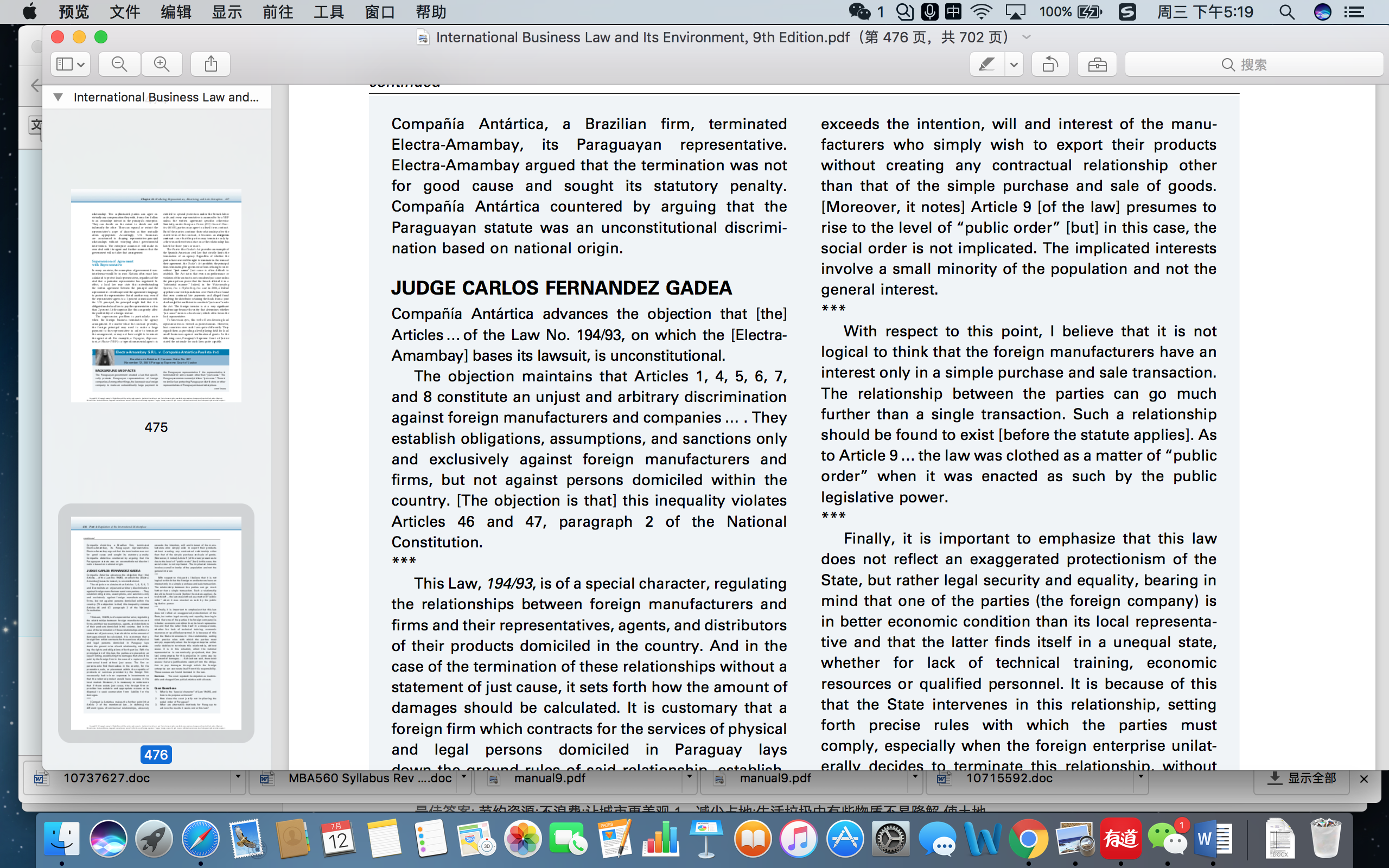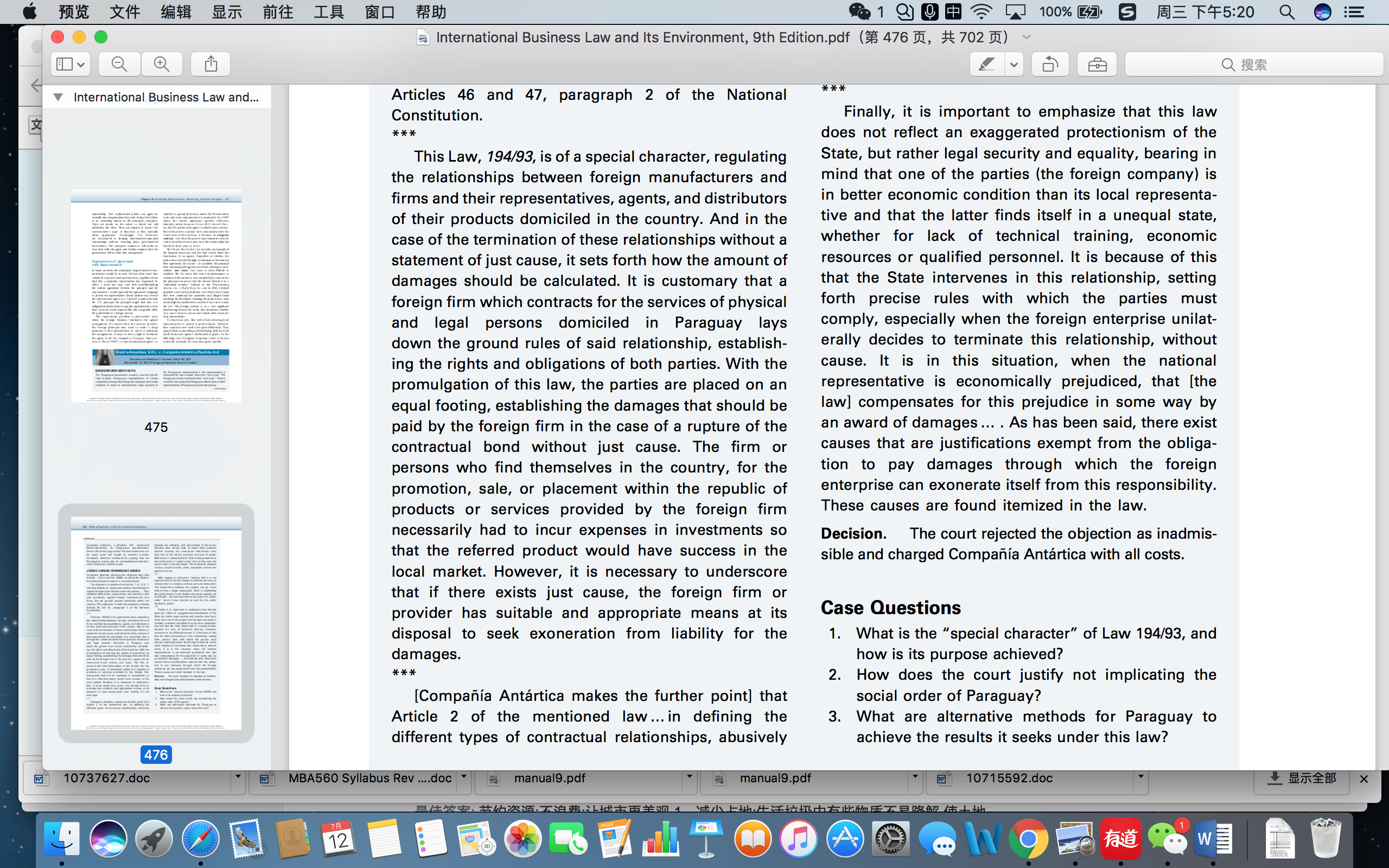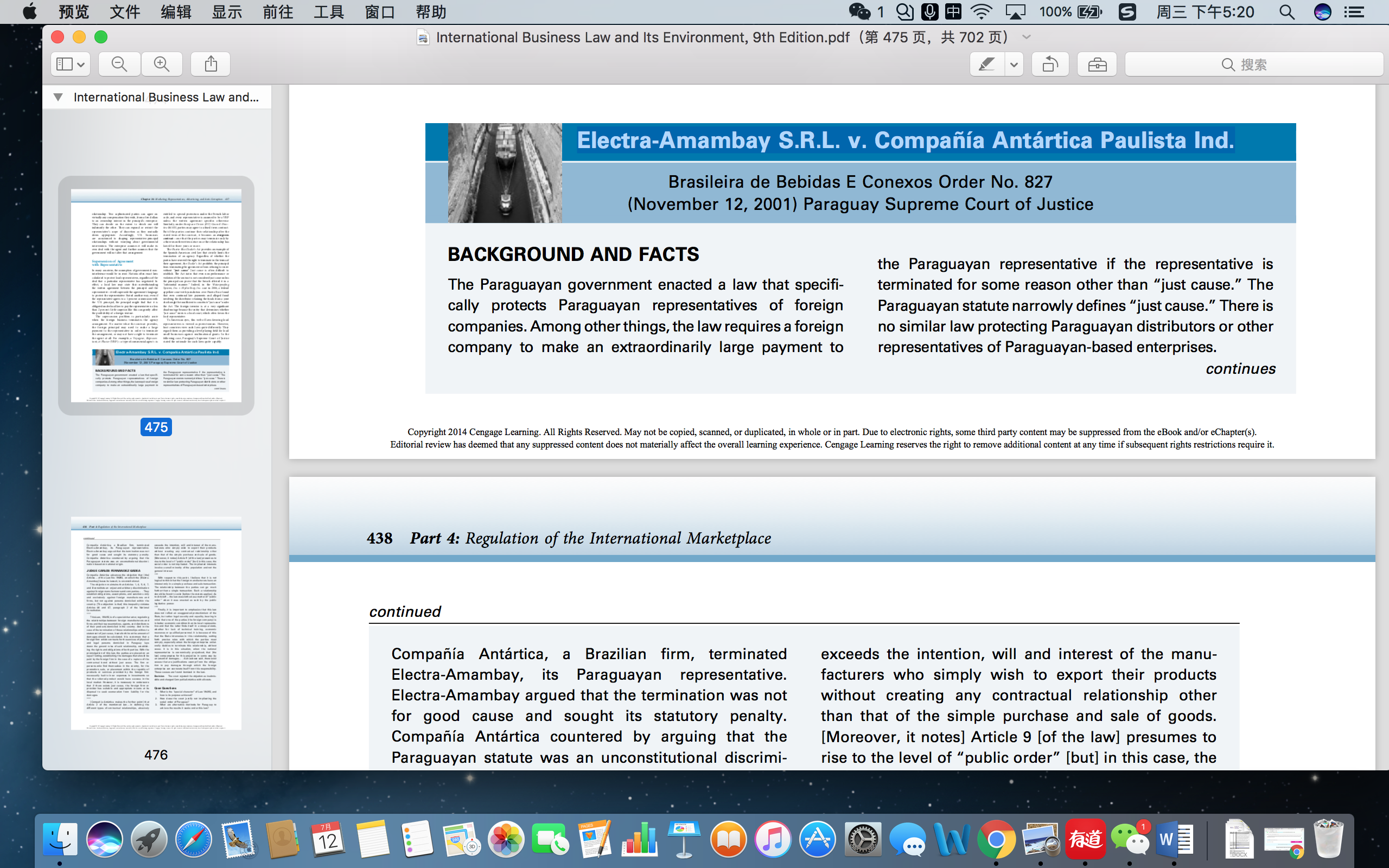Refer to the discussion and the cases at pgs 437-439 of the text concerning ?Supersession of Agreement with Representative?.Discuss what you believe are the benefits and the detriments to the host country of having laws like those described?What effect do you believe such laws have on the host country?s ability to attract investment and technology licensing from foreign firms?
am is as are I; an an: I\"? I; 1mm- HE'F'FSnQ l'\\ ( a) Fl]J Qi qess Compania Antartica, a Brazilian firm, terminated Electra-Amambay, its Paraguayan representative. Electra-Amambay argued that the termination was not for good cause and sought its statutory penalty. Compaia Antartica countered by arguing that the Paraguayan statute was an unconstitutional discrimi- nation based on national origin. JUDGE CARLOS FERNANDEZ GADEA Compaia Antartica advances the objection that [the] Articles of the Law No. 194/93, on which the [Electra- Amambay] bases its lawsuit, is unconstitutional. The objection maintains that Articles 1, 4, 5, 6, 7, and 8 constitute an unjust and arbitrary discrimination against foreign manufacturers and companies . They establish obligations, assumptions, and sanctions only and exclusively against foreign manufacturers and firms, but not against persons domiciled within the country. [The objection is that] this inequality violates Articles 46 and 47, paragraph 2 of the National Constitution. *** 475 This Law, 1.94/93, is of a special character, regulating the relationships between foreign manufacturers and firms and their representatives, agents, and distributors of their products domiciled in the country. And in the case of the termination of these relationships without a statement of just cause, it sets forth how the amount of damages should be calculated. It is customary that a foreign firm which contracts for the services of physical and legal persons domiciled in Paraguay lays IQQD'milOwmi exceeds the intention, will and interest of the manu- facturers who simply wish to export their products without creating any contractual relationship other than that of the simple purchase and sale of goods. [Moreover, it notes] Article 9 [of the law] presumes to rise to the level of "public order" [but] in this case, the social order is not implicated. The implicated interests involve a small minority of the population and not the general interest. *** With respect to this point, I believe that it is not logical to think that the foreign manufacturers have an interest only in a simple purchase and sale transaction. The relationship between the parties can go much further than a single transaction. Such a relationship should be found to exist [before the statute applies]. As to Article 9 the law was clothed as a matter of \"public order\" when it was enacted as such by the public legislative power. *** Finally, it is important to emphasize that this law does not reflect an exaggerated protectionism of the State, but rather legal security and equality, bearing in mind that one of the parties (the foreign company) is in better economic condition than its local representa- tive and that the latter finds itself in a unequal state, whether for lack of technical training, economic resources or qualied personnel. It is because of this that the State intervenes in this relationship, setting forth precise rules with which the parties must comply, especially when the foreign enterprise unilat- me is as are I; an an I\"? I; 1mm- International Business Law and Its Environment, 9th Edition.pdf (g 476 31, k 702 E) v ll wl'llll EE 'F'F5i20 Qi qess 475 Articles 46 and 47, paragraph 2 of the National Constitution. *** This Law, 194/93, is of a special character, regulating the relationships between foreign manufacturers and firms and their representatives, agents, and distributors of their products domiciled in the country. And in the case of the termination of these relationships without a statement of just cause, it sets forth how the amount of damages should be calculated. It is customary that a foreign firm which contracts for the services of physical and legal persons domiciled in Paraguay lays down the ground rules of said relationship, establish- ing the rights and obligations of both parties. With the promulgation of this law, the parties are placed on an equal footing, establishing the damages that should be paid by the foreign firm in the case of a rupture of the contractual bond without just cause. The firm or persons who find themselves in the country, for the promotion, sale, or placement within the republic of products or services provided by the foreign firm necessarily had to incur expenses in investments so that the referred product would have success in the local market. However, it is necessary to underscore that if there exists just cause, the foreign firm or provider has suitable and appropriate means at its disposal to seek exoneration from liability for the damages. *** [Compal'a Antrtica makes the further point] that Article 2 of the mentioned law... in dening the different types of contractual relationships, abusively *x-i- Finally, it is important to emphasize that this law does not reflect an exaggerated protectionism of the State, but rather legal security and equality, bearing in mind that one of the parties (the foreign company) is in better economic condition than its local representa- tive and that the latter finds itself in a unequal state, whether for lack of technical training, economic resources or qualied personnel. It is because of this that the State intervenes in this relationship, setting forth precise rules with which the parties must comply, especially when the foreign enterprise unilat- erally decides to terminate this relationship, without cause. It is in this situation, when the national representative is economically prejudiced, that [the law] compensates for this prejudice in some way by an award of damages . As has been said, there exist causes that are justifications exempt from the obliga- tion to pay damages through which the foreign enterprise can exonerate itself from this responsibility. These causes are found itemized in the law. Decision. The court rejected the objection as inadmis- sible and charged Compaia Antrtica with all costs. Case Questions 1. What is the \"special character" of Law 194/93, and how is its purpose achieved? 2. How does the court justify not implicating the social order of Paraguay? 3. What are alternative methods for Paraguay to achieve the results it seeks under this law? i' ii! 32% t: an HERE I; an .0077 , 'Vl.@\\l@\\ll Q92: V International Business Law and... BACKGROUND AND FACTS the Paraguayan representative if the representative is The Paraguayan government enacted a law that speci- cally protects Paraguayan representatives of foreign companies. Among other things, the law requires a foreign company to make an extraordinarily large payment to terminated for some reason other than \"just cause.\" The Paraguayan statute narrowly defines \"just cause.\" There is no similar law protecting Paraguayan distributors or other representatives of Paraguayan-based enterprises. continues 475 Copyright zou Cengrge Learning. All Rights Resmmi. Mny notbe wnied, runner). or duplicated. inwnnie nr inpen. 1mm electronic rights, rnrne third party coolant maybe suppressed from the eBook Ind/M eChaptaKs). Editorial review in: deemed rim any snpprerreri nonreni does not mamidlylact the menu learning experim. Cangpge mangrermer lb: right tn rernm additional mutant atmytime ifsubseqimtrights rerrrimim require it. 438 Part 4: Regulation of the International Marketplace continued exceeds the intention, will and interest of the manu- facturers who simply wish to export their products without creating any contractual relationship other than that of the simple purchase and sale of goods. [Moreover, it notes] Article 9 [of the law] presumes to rise to the level of "public order" [but] in this case, the Compaia Antartica, a Brazilian firm, terminated Electra-Amambay, its Paraguayan representative. EIectra-Amambay argued that the termination was not for good cause and sought its statutory penalty. Compaia Antartica countered by arguing that the Paraguayan statute was an unconstitutional discrimi









